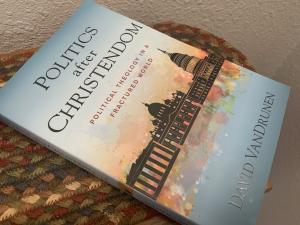 I very much wanted to like David VanDrunen’s new book Politics After Christendom: Political Theology in a Fractured World. In the wake of the recent flurry of Catholic scholarship arguing both for and against classical liberalism, I’ve often thought that’s high time for Protestants to enter the lists—and perhaps offer something more interesting than either lukewarm defenses of the neoliberal status quo or historically questionable apologetics for medieval Europe. VanDrunen—who writes from the classically Reformed tradition—is certainly no intellectual slouch, but I fear his new volume leaves a great deal to be desired.
I very much wanted to like David VanDrunen’s new book Politics After Christendom: Political Theology in a Fractured World. In the wake of the recent flurry of Catholic scholarship arguing both for and against classical liberalism, I’ve often thought that’s high time for Protestants to enter the lists—and perhaps offer something more interesting than either lukewarm defenses of the neoliberal status quo or historically questionable apologetics for medieval Europe. VanDrunen—who writes from the classically Reformed tradition—is certainly no intellectual slouch, but I fear his new volume leaves a great deal to be desired.
Almost the entirety of the book hinges on whether the reader accepts VanDrunen’s novel, if highly idiosyncratic, thesis: the “Noahic covenant” of Genesis 8:21–9:17 is the foundational principle of any Christian political theology. In case it’s been a while since you read these verses, I reproduce them below.
And when the Lord smelled the pleasing aroma, the Lord said in his heart, “I will never again curse the ground because of man, for the intention of man’s heart is evil from his youth. Neither will I ever again strike down every living creature as I have done. While the earth remains, seedtime and harvest, cold and heat, summer and winter, day and night, shall not cease.”
And God blessed Noah and his sons and said to them, “Be fruitful and multiply and fill the earth. The fear of you and the dread of you shall be upon every beast of the earth and upon every bird of the heavens, upon everything that creeps on the ground and all the fish of the sea. Into your hand they are delivered. Every moving thing that lives shall be food for you. And as I gave you the green plants, I give you everything. But you shall not eat flesh with its life, that is, its blood. And for your lifeblood I will require a reckoning: from every beast I will require it and from man. From his fellow man I will require a reckoning for the life of man.
“Whoever sheds the blood of man,
by man shall his blood be shed,
for God made man in his own image.
And you, be fruitful and multiply, increase greatly on the earth and multiply in it.”Then God said to Noah and to his sons with him, “Behold, I establish my covenant with you and your offspring after you, and with every living creature that is with you, the birds, the livestock, and every beast of the earth with you, as many as came out of the ark; it is for every beast of the earth. I establish my covenant with you, that never again shall all flesh be cut off by the waters of the flood, and never again shall there be a flood to destroy the earth.” And God said, “This is the sign of the covenant that I make between me and you and every living creature that is with you, for all future generations: I have set my bow in the cloud, and it shall be a sign of the covenant between me and the earth. When I bring clouds over the earth and the bow is seen in the clouds, I will remember my covenant that is between me and you and every living creature of all flesh. And the waters shall never again become a flood to destroy all flesh. When the bow is in the clouds, I will see it and remember the everlasting covenant between God and every living creature of all flesh that is on the earth.” God said to Noah, “This is the sign of the covenant that I have established between me and all flesh that is on the earth.”
Now, I may well be wrong about this, but the plain sense of this text doesn’t suggest to me that it’s a statement of political theology per se. I’ve always understood these verses as primarily centered on God’s promise never again to destroy the world by flooding. That flood judgment, Genesis 6 tells us, was God’s response to the violence of man toward man; accordingly, in pledging not to once again impose such a judgment, God explains that the functions of justice will now be mediated between man and man. God, in short, opens up the space for human beings to form a rule of law.
This conclusion, however, is descriptive—it states the truth that necessarily follows from God’s pledge not to flood the world in response to violence. If violence is wrong, and God will not intervene to police it directly, it logically falls to man to do justice in the event of violence. The passage does not appear to be—unless you squint hard—normative, or a direct instruction about how human beings ought to comprehensively structure their societies going forward.
VanDrunen, however, is absolutely determined to read this covenant as the ur-text of political philosophy. He stresses three major points in particular: 1) the covenant’s direction to fill the earth; 2) the covenant’s instruction to eat plants and animals responsibly; and 3) the covenant’s establishment of a principle of “rectifying justice,” or the lex talionis. These points, VanDrunen contends, mark out not only the requirements of any legitimate government, but also its limitations. Only those governmental functions expressly provided for by the Noahic covenant, VanDrunen posits, are legitimate actions by the state.
Why the Noahic covenant, though? Why not follow Rousas Rushdoony and Greg Bahnsen and argue for a “theonomic” approach treating the Mosaic covenant as the lodestar of biblical political order? Or, alternatively, why not look to Christ as the inaugurator of a new, final covenant of love? To such arguments, VanDrunen has a straightforward answer: both of those covenants were given only to limited groups, whereas the Noahic covenant is universal in application. The covenant at Sinai was given to the Israelites, God’s chosen people, and the redemptive promises of Christ only apply to His elect, the church. By contrast, the Noahic covenant—coming as it did after the Flood—extends over all people and has never been directly abrogated.
It is here that VanDrunen first begins to run into serious problems. For one thing, the idea that the Noahic covenant is “general” whereas others are “special” depends upon a particular view of the Flood as global and totalizing, such that Noah and his family were the only living human survivors on the planet. But elsewhere in the book, VanDrunen suggests that it makes no real difference to his argument whether the Flood was global or localized. That is wrong: it makes all the difference, because by its plain text, the covenant applies to “Noah and his sons,” who are distinguished from “flesh” and “creatures”—not the world as a whole. VanDrunen’s entire case for the Noahic covenant’s enduring validity is grounded in its alleged universality, so if VanDrunen cannot defend a worldwide flood, his entire argument falls apart. In a similar vein, VanDrunen is very clearly operating from the classically Reformed understanding of limited atonement—which allows him to argue that the work of Christ did not substantially disrupt the possibilities of political theology, since secular governments will always reign over elect and reprobate alike without knowing which is which—but this point is never argued for at length, which leaves the book’s argument feeling narrowly parochial.
But most seriously of all, VanDrunen appears entirely unable to point to a single authority within the broad tradition of Christian thought who shares his approach to the Noahic covenant (the closest he comes is a citation to a 2016 book allegedly presenting a similar argument). If I am wrong about this, I welcome correction—but as it stands, I could find no citation in the text to any council, church father, pope, Reformer, monk, nun, or eminent academic sharing VanDrunen’s emphasis on the Noahic covenant as the locus of political theology. There’s an old saying in the legal profession that you never want to hear from a judge that your argument was “novel” or “creative,” because that usually means your case lacked supporting authority—and the same is at least somewhat true, I would contend, in theology. If your argument is so unique that no one in two millennia of the Christian faith has ever made it before, the burden is on you to make out your case.
Indeed, VanDrunen’s argument is so unusual that I would’ve expected 75% of the book to be an exposition and defense of that central claim. (Say what you will about David Bentley Hart’s recent case for universalism, at least he acknowledged how heavy a burden he had to shoulder in arguing against centuries of tradition.) But VanDrunen spends far too little time on his core thesis, relying mainly on strained readings of other biblical texts as “establishing”—mostly by their silence on the matter—that the Noahic covenant remains in full effect. Perhaps the low point of this analysis comes in VanDrunen’s treatment of Romans 13, the text generally treated as central to Christian political theology: VanDrunen argues that the Apostle Paul, as an eminent rabbinical scholar, must have been aware of the Noahic covenant and drawn upon it while writing Romans. As evidence for this, VanDrunen notes that just as man is authorized to levy retributive justice in the Noahic covenant, the magistrate is authorized to wield the sword in Romans.
VanDrunen’s claim of parallelism here is deeply unpersuasive. For one thing, it ignores an obvious discontinuity between the two passages: whereas the retributive-justice relation in Genesis is framed as symmetrical (man avenges himself upon man), Romans explicitly rejects such a reciprocal relation, instructing that the magistrate—not the wronged individual—carry out justice. For another, Romans 13 simply says nothing whatsoever about the Noahic covenant: Paul clearly knew how to cite the Old Testament, and did so extensively, so if Romans 13 were a reiteration of the Noahic covenant, why not simply say so? That is doubly true given that Romans discusses the applicability of the “old law” at great length: if part of the old law were still in force in exactly the same way, it would seem incumbent upon Paul to state that outright. In short, the burden is on VanDrunen, as the defender of a novel thesis, to make out a stronger case than this.
But let us suppose for the moment that you find yourself persuaded by VanDrunen’s core argument. What then?
Building on the Noahic covenant, VanDrunen proceeds to evaluate a vast number of issues—natural rights, economics, law, authority and resistance, religious liberty, and many more—through the prism of that original rule. For example, VanDrunen argues that since man is told to fill the earth, man requires an economic system that will support him in doing so, and only a market economy has historically been shown to be up to snuff. So too, since a government must extend over those both within and without the church, religious liberty and toleration are warranted. And so on it goes.
For those not already completely sold on VanDrunen’s paradigm, this extended discussion verges on tedium. Wholly apart from the theological points already mentioned, there are real questions here about whether the slender reed of the Noahic covenant can possibly bear the load VanDrunen places upon it. Is it really possible to go from “fill the earth” to a denial of the need for state-run social services, without a tremendous number of questionable intermediate moves?
Some of this extrapolation would perhaps be more forgivable if VanDrunen’s political prescriptions were striking and creative. But alas, they are not. There is not a single concrete policy position in VanDrunen’s book that would’ve been out of place in the 2012 Republican Party platform, which makes the whole project feel more like an extended exercise in special pleading for predetermined conclusions than a serious interrogation of political theory. Indeed, virtually every time one of the “wicked problems” of political philosophy rears its head—for instance, could two Jehovah’s Witnesses exercise their right of religious freedom to prevent their dying child from receiving a blood transfusion?—VanDrunen is content to declare that the Noahic covenant provides no clear answers. This is, to say the least, profoundly dissatisfying—especially given how far VanDrunen is willing to stretch the covenant’s applicability when more familiar political topics are on the table.
Equally frustrating, to my mind, is VanDrunen’s cursory treatment of contrary views. A major selling point of this book, for me, was its promised engagement with serious mainstream political thinkers—Rawls, Dworkin, MacIntyre, Hauerwas, O’Donovan, and many others all make appearances—and to his great credit, VanDrunen draws on an astonishingly broad range of authorities. But when engaging with these perspectives, VanDrunen is all too often content to dismiss them as simply failing to properly understand the implications of the Noahic covenant—an odd standard, at best, against which to evaluate one’s interlocutors from rival traditions.
At times, it is not clear if VanDrunen even understands the dimensions of the arguments he makes in response to critics. For instance, in the course of defending capitalism against Malthusian prophets of ecological doom, VanDrunen comments that developed economies tend to experience falling birth rates as prosperity increases, which in turn guards against any risk of overpopulation. But the implications here are totally lost on VanDrunen: developed economies have falling birthrates because of widely available contraceptive technologies, which depress fertility rates (and, in Japan and Western Europe, have contributed to a graying population and birth rates well below replacement levels). How can this possibly be squared with the Noahic mandate to “fill the earth”? Are we to conclude that capitalism as practiced today inevitably tends to undermine that very specific covenantal mandate, given a long enough time horizon? VanDrunen doesn’t even touch the question.
(This is an aside, but it’s puzzling that the Noahic covenantal mandate of responsible plant and animal consumption never much enters the picture. At the very least, VanDrunen’s extrapolative tendencies would seem to imply that certain husbandry practices, such as factory farming, are grossly immoral. Nary a word along such lines, however, appears in the book.)
I could go on and on, but I presume this review has already run on long enough. As I see it, Politics After Christendom is a tremendous missed opportunity to confront some of today’s most urgent political questions. The book may be of interest to Reformed readers committed to a strictly literal hermeneutic and a particular interpretation of covenant theology, but it offers very little to readers who are not immediately convinced of its unconventional thesis. There are far more engaging texts in which to invest your time.












